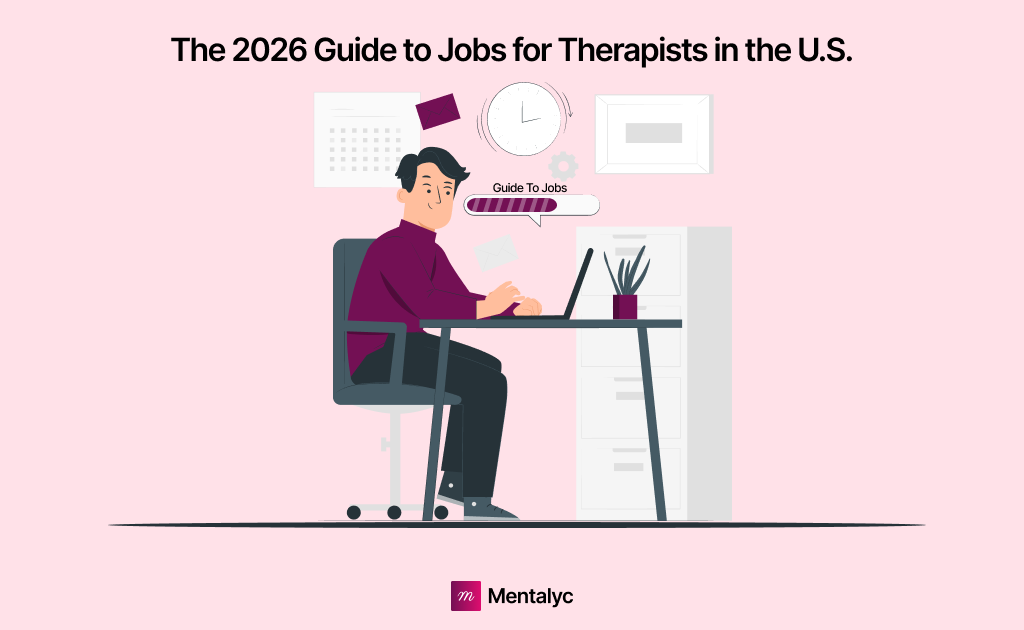From private practice to AI development, how to find a career that fits your life.
Key Takeaways
- The landscape is shifting: Telehealth and “portfolio careers” are replacing the standard 40-hour clinic week.
- New frontiers: Tech companies (like Mentalyc) are hiring therapists for non-clinical roles like Clinical Prompt Engineering.
- Burnout protection: We provide a checklist to vet employers for red flags before you sign.
- Stay connected: Follow Mentalyc on LinkedIn for exclusive job drops, AI career opportunities, and documentation hacks.
Jobs for therapists in the U.S. are changing fast. The days of choosing solely between “community mental health” and “private practice” are over. As we look toward 2026, the field is exploding with flexible telehealth roles, hybrid positions, and entirely new categories of AI-related jobs for therapists.
At Mentalyc, therapists are at the center of everything we build. We support pre-licensed clinicians who rely on us for documentation, and we partner with therapists in product and AI roles that shape the future of the field. If you’re exploring what’s next in job of therapists, clinically or in tech, this guide is your starting point.
Therapy Job Settings & Roles: Finding Your Fit
1. Traditional Clinical Settings
Traditional settings remain the foundation of most therapy careers, but each environment offers its own pace and personality. Although most careers still start here, the culture varies wildly:
- Outpatient Clinics & Groups: Steady referrals and admin support, but often high productivity demands.
- Hospitals & Residential: High acuity and multidisciplinary teamwork. Great for crisis skill-building.
- Schools & Universities: Tied to academic calendars (great for holidays) with a focus on student development.
2. Telehealth and Remote Therapy Jobs
Remote work is no longer a rarity; it’s a mainstream option in mental health.
- The Setup: You might work W-2 for a digital health giant, contract with a matching platform, or run a solo virtual practice.
- The Pros: Zero commute, access to clients in underserved areas, and location flexibility (within licensure limits).
- The Cons: “Zoom fatigue” and the isolation of working from home.
Pro Tip: Remote work requires elite time management. Many of our users at Mentalyc are hybrid clinicians who use our AI scribe to finish notes between virtual sessions so they can log off the second the workday ends.
3. Part-Time & Flexible Therapy Jobs
A growing number of therapists are embracing “portfolio careers,” blending several part-time roles instead of committing to a single full-time job. Many therapists are building a mix:
- 2 days of private practice.
- 1 day of teaching or supervision.
- Remainder: Parenting, creative work, or rest. This is a powerful strategy for burnout recovery and parents returning to the workforce.
The New Frontier: AI & Tech-Enabled Roles for Therapists
One of the most exciting developments in the field is the rise of tech-enabled clinical roles. Companies building mental health products increasingly rely on therapists to guide their work — not as full-time clinicians, but as collaborators shaping how technology supports the therapeutic process. At Mentalyc, for example, therapists contribute to product design, safety reviews, and AI development.
Emerging Tech Titles:
- Clinical Prompt Engineer (Therapy AI Specialist): You design the “prompts” that guide AI and surface potential risk cues for the human clinician to review.
- Therapist Clinical Consultant: You act as the subject matter expert for engineering teams, ensuring products are safe, ethical, and actually helpful for clinicians.
- Content & Curriculum Designer: You translate evidence-based protocols (like CBT or DBT) into digital formats.
Want one of these jobs?
We post these niche roles (and others we find in the industry) directly to our social channels. Follow Mentalyc on LinkedIn to catch these listings before they hit the major job boards.
Salary & Job Outlook (2025-2026 Estimates)
Salaries vary by state and licensure level. Below are median estimates based on recent labor data and tech sector trends.
Role: Mental Health Counselor (LCMHC/LPC)
- Est. Annual Salary: $59,000 – $75,000
- What Affects Pay: Counselors in private practice usually earn more, while agency and community mental health settings tend to fall on the lower end. Experience with specific treatment modalities can also increase earning potential.
Role: Marriage & Family Therapist (LMFT)
- Est. Annual Salary: $63,000 – $80,000
- What Affects Pay: LMFTs who specialize in system-level work (couples, families, high-conflict cases) often command higher rates, especially in private practice or specialty clinics.
Role: Clinical Social Worker (LCSW)
- Est. Annual Salary: $62,000 – $85,000
- What Affects Pay: LCSWs working in hospitals, integrated care settings, or administrative roles generally earn more. Additional certifications and supervisory responsibilities can push salaries into the upper range.
Role: Psychologist (PhD/PsyD)
- Est. Annual Salary: $90,000 – $120,000+
- What Affects Pay: Psychologists with testing and assessment expertise typically earn the highest rates. Forensic work, health psychology, and leadership roles also raise salary ceilings significantly.
Role: Clinical Prompt Specialist / Engineer (Tech)
- Est. Annual Salary: $80,000 – $130,000+
- What Affects Pay: These emerging roles in AI and digital health often include stock options or equity. Therapists with strong writing skills, understanding of evidence-based frameworks, and experience with digital tools tend to qualify for the higher end of this range.
Source: Industry analysis & aggregated job market data. Your actual salary can be higher or lower depending on state, setting, years of experience, and whether you’re in private practice.
Red Flags: How to Spot a Bad Employer
Not all jobs are created equal. When interviewing, look for these warning signs:
- The “Unlimited” Caseload: If they expect 30+ clients a week plus admin time, run. That is a recipe for rapid burnout.
- The “Catch-All” Description: A role that asks you to treat “all ages and all disorders” usually lacks clinical focus and support.
- Lack of Admin Infrastructure: If they don’t pay for admin time or offer any tools to ease documentation, it’s a sign your time may not be a real priority.
The “Interview Checklist” for Therapists
- [ ] Is supervision included and paid? (Crucial for pre-licensed clinicians).
- [ ] What is the cancellation policy? Do I still get paid?
- [ ] Is there a budget for Continuing Education (CEUs)?
- [ ] Are you open to AI tools to help with my documentation load?
The Documentation Factor
No matter the job, you will have paperwork. A sustainable workflow is:
- Routine Notes: 5–8 minutes.
- Intakes: 15–25 minutes. In many productivity-based roles, anything longer than ~15 minutes per routine note often turns into effectively unpaid time.
Early Career Support
If you’re pre-licensed, an intern, or a therapist in training, documentation often becomes unpaid labor added to an already demanding schedule. Mentalyc offers an Early Career Discount to support you during this stage – helping you finish notes in minutes, not hours, so you can focus on learning and client care. This offer is for individuals actively working toward licensure and doesn’t apply to team plans.
Apply for your Early Career Discount here
Frequently Asked Questions (FAQs) about Jobs for Therapists
Conclusion: Stay Connected to the Future of Therapy Work
The best non-clinical and tech-forward therapy jobs often appear quietly – through networks, startups, and early-stage companies. Follow Mentalyc on LinkedIn to get early access to AI-related job opportunities, therapist-friendly tech roles, and updates on how documentation and clinical work are evolving.
We frequently hire therapists for product and AI roles, and we share these openings with our LinkedIn community first.
Why other mental health professionals love Mentalyc

“For those who have hesitations … It is a lifesaver. It will change your life and you have more time to be present with your patients.”
Licensed Clinical Social Worker

“It immediately changed my quality of life, personally and professionally. I went from 3–4 hours a week of notes to 1 hour at most … that alone is invaluable personally and professionally.”
Owner/Independently Licensed Marriage & Family Therapist (IMFT)

“If I were recommending this software to a colleague, I would tell them that it is the best thing that they could do for their practice.”
Licensed Professional Counselor

“Do yourself a favor, make your life easier. Use the tools that are readily available … I found Mentalyc to be one of the best tools that I’ve ever used.”
Licensed Marriage and Family Therapist






